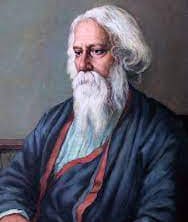R Tagore | Senses | Analytical Study
Rabindranath Tagore’s Poem ‘Senses’-An Analytical Study
The subject matter of the poem “Senses” by Rabindranath Tagore rotates around the speaker’s view on deliverance and their embrace of sensory experiences. The speaker expresses that they do not find deliverance or freedom in renunciation or detachment from the world. Instead, they find a sense of liberation and joy in the myriad bonds and delights of life.
The poem employs the literary device of contrast to emphasize the speaker’s perspective. They assert that they feel the embrace of freedom in a thousand bonds of delight, suggesting that they find fulfillment and liberation through engaging with the world rather than renouncing it. This contrast challenges the notion that liberation can only be attained through renunciation.
The speaker acknowledges the divine presence in their experiences, comparing it to a fresh draught of wine that fills their vessel to the brim with various colors and fragrances. They believe that the divine pours these sensory delights for them, connecting their enjoyment of the world to a higher spiritual experience.
The poem further discusses the speaker’s intention to bring the divine flame into the world. They envision their world lighting a hundred different lamps with the divine flame, symbolizing the illumination and devotion they seek to spread. This signifies their desire to integrate the divine presence into their everyday experiences and actions.
The poem concludes with the speaker affirming their decision to keep their senses open and receptive. They refuse to shut the doors of their senses, recognizing that the delights of sight, hearing, and touch bear the delight of the divine. They believe that their illusions will transform into joy and their desires will blossom into love.
After all, “Senses” delves into the speaker’s perspective on deliverance and the embrace of sensory experiences. The poem challenges the notion that freedom and liberation can only be found through renunciation, instead highlighting the joy and fulfillment that can be experienced through engaging with the world and embracing the senses. The poem celebrates the connection between sensory delights and the divine presence, emphasizing the transformative power of joy and love. 0 0 0
N.B. The article originally belongs to the book ‘Analytical Studies of Selected Poems of Rabindranath Tagore‘ by Menonim Menonimus.
Books of Literary Criticism by M. Menonimus:
- World Short Story Criticism
- World Poetry Criticism
- World Drama Criticism
- World Novel Criticism
- World Essay Criticism
- Indian English Poetry Criticism
- Indian English Poets and Poetry Chief Features
- Emily Dickinson’s Poetry-A Thematic Study
- Walt Whitman’s Poetry-A Thematic Study
- Critical Essays on English Poetry
- Tawfiq al-Hakim’s Novel: Return of the Spirit-An Analytical Study
- Tawfiq al-Hakim’s Novel: ‘Yawmiyyat Naib Fil Arayaf’-An Analytical Study
- Analytical Studies of Some Arabic Short Stories
- A Brief History of Arabic Literature: Pre-Islamic Period (500 AD-622 AD)
- A Brief History of Arabic Literature: Early Islamic Period (622 AD-661 AD)
- Reviews on William Shakespeare’s Works
- Reviews of Charles Dickens’ Works
- Reviews of John Milton’s Literary Works
- Reviews of Some Iconic Travelogues
- Shakespeare’s Sonnets-Critical Studies
- Analytical Studies of Selected Poems of Sarojini Naidu
- Analytical Studies of Selected Poems of Rabindranath Tagore …
Additional Searches :
- Rabindranath Tagore
- 10 Timeless Poems by Rabindranath Tagore
- Rabindranath Tagore as a Poet
- Rabindranath Tagore Critical Analysis
- Rabindranath Tagore Poems
- Gitanjali by Rabindranath Tagore
- Walk Alone by Rabindranath Tagore
.











